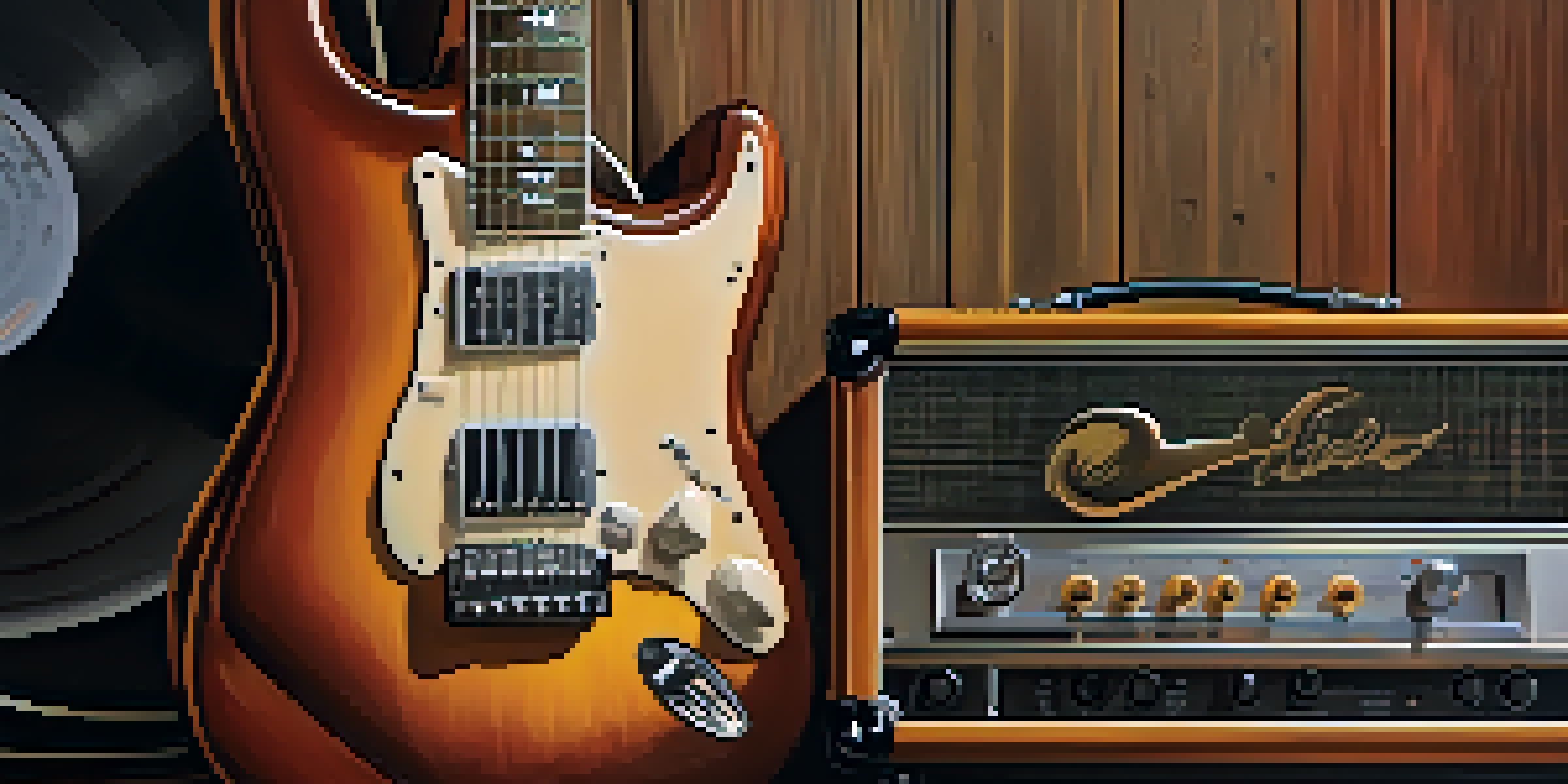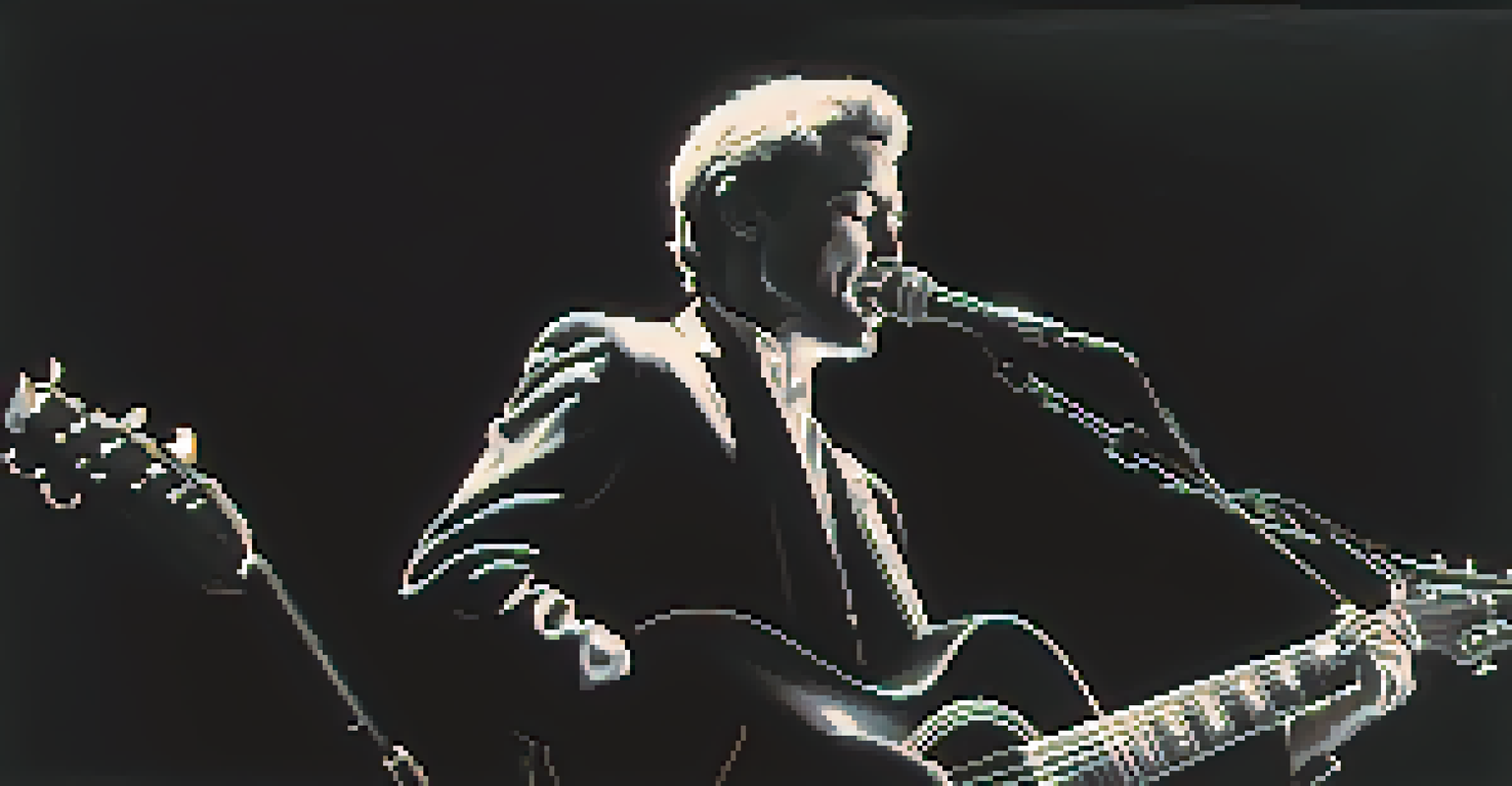Guitar Legends: Influencing Cultures Through Music

The Birth of Guitar Legends: A Cultural Revolution
The guitar has long been more than just a musical instrument; it represents a cultural revolution. From the moment the electric guitar was introduced, it changed the soundscape of music forever. Legends like Chuck Berry and Jimi Hendrix not only showcased their technical prowess but also influenced societal norms and youth culture.
The guitar is a miniaturized orchestra in itself.
In the 1950s, rock 'n' roll emerged as a powerful vehicle for cultural expression, challenging the status quo. Artists like Berry used their music to address social issues, making the guitar not just a tool for entertainment, but a means of communication. This cultural shift paved the way for future generations of musicians to use their platforms for change.
As the decades rolled on, the guitar became synonymous with rebellion and freedom. From the psychedelic sounds of the 60s to the punk rock explosion of the 70s, guitar legends helped shape the identity of entire generations.
The Sound of Protest: Guitarists as Social Commentators
Guitarists have often taken on the role of social commentators, using their music to voice dissent and inspire change. Artists like Bob Dylan, with his poignant lyrics and simple guitar melodies, became iconic figures during the civil rights movement. His songs resonated with a generation looking for hope and direction.

Similarly, the music of Carlos Santana blended rock with Latin influences, addressing themes of unity and peace. His legendary performance at Woodstock in 1969 exemplified how the power of guitar could transcend barriers and bring people together. These musicians didn’t just play notes; they played a part in shaping societal attitudes.
Guitar: A Cultural Revolution
The guitar has evolved from a musical instrument into a powerful symbol of cultural expression and social change.
The tradition of using music as a form of protest continues today, with artists like Billie Eilish and Hozier taking up the mantle. Their guitar-driven songs reflect contemporary issues, proving that the influence of legendary guitarists is still alive and well.
The Influence of Blues: Roots of Modern Guitar Legends
The blues is often considered the backbone of modern music, and its influence on guitar legends cannot be overstated. Artists like B.B. King and Muddy Waters laid the groundwork for future genres, infusing their music with emotional depth and storytelling. The guitar was their voice, conveying pain, joy, and resilience.
Music is the universal language of mankind.
These blues legends inspired countless musicians, from Eric Clapton to Stevie Ray Vaughan, who incorporated these elements into their own work. Their unique styles reflect a blend of technical skill and heartfelt expression, creating a rich tapestry of sound. The blues not only shaped their music but also defined their cultural identities.
Today, the impact of blues guitarists is evident in various genres, including rock, jazz, and even hip-hop. This cross-pollination of musical styles highlights the enduring legacy of the guitar as a versatile instrument that can adapt and evolve.
Iconic Performances: Defining Moments in Guitar History
Throughout history, certain performances have defined the legacy of guitar legends. For instance, Jimi Hendrix's rendition of 'The Star-Spangled Banner' at Woodstock remains a powerful moment in music history. It was a bold statement that transcended the musical realm, reflecting the tumultuous socio-political climate of the time.
Another unforgettable performance was Eric Clapton's 'Unplugged' session in 1992, where he stripped down his hits to their core essence. This performance not only showcased his virtuosity but also redefined how acoustic guitar could be approached in popular music. Such moments create lasting memories and inspire both musicians and fans alike.
Guitarists as Social Commentators
Throughout history, guitarists have used their music to address societal issues and inspire hope, making them key figures in social movements.
These iconic performances serve as milestones that remind us of the emotional power of guitar music. They capture a moment in time where the music resonated with audiences, creating a sense of unity and shared experience.
Global Influence: Guitar Legends Around the World
While the guitar is often associated with Western music, its influence spans the globe. Artists like Paco de Lucía brought flamenco guitar to the forefront, showcasing the instrument's versatility and cultural significance in Spain. His innovative techniques inspired countless guitarists to explore beyond traditional boundaries.
In Africa, legends like Ali Farka Touré blended traditional Malian music with blues, creating a unique sound that resonates with audiences worldwide. His music not only highlights the guitar's adaptability but also emphasizes the interconnectedness of global music cultures. This cross-cultural exchange enriches the musical landscape.
Today, guitarists from various backgrounds continue to innovate and inspire, proving that the guitar is a universal language. This global influence fosters collaboration and creativity, resulting in a vibrant tapestry of musical styles.
The Evolution of Guitar Technology: Shaping Sound and Style
The evolution of guitar technology has played a crucial role in shaping the sound and style of guitar legends. From the invention of the electric guitar to advancements in amplifiers and effects pedals, technology has expanded creative possibilities. Icons like Les Paul and Leo Fender revolutionized the instrument, making it an essential part of modern music.
As guitarists experiment with new technology, they push the boundaries of what is possible. The use of digital effects, looping, and recording techniques allows artists to create intricate soundscapes that were once unimaginable. This continual evolution keeps the music fresh and engaging, inviting new generations to pick up the instrument.
Legacy Inspires Future Musicians
The enduring influence of guitar legends fosters mentorship and creativity, ensuring their innovative spirit continues to inspire new generations.
The marriage of technology and artistry has led to the emergence of diverse genres, from electronic rock to progressive metal. Guitar legends are now not only musicians but also innovators who embrace technology to enhance their creative expression.
Legacy and Inspiration: Passing the Torch to Future Generations
As guitar legends age, their legacy becomes a source of inspiration for budding musicians. Many take on mentorship roles, sharing their knowledge and experience with the next generation. This passing of the torch ensures that the spirit of innovation and creativity continues to thrive.
Programs and workshops dedicated to guitar education allow young players to learn from the masters, fostering a sense of community and collaboration. Many legendary guitarists also use social media to connect with fans and aspiring musicians, sharing tips and personal stories that resonate with their audience.

Ultimately, the influence of guitar legends is felt far beyond their lifetimes. Their music and stories continue to inspire, reminding us of the power of the guitar as a tool for self-expression and cultural dialogue.